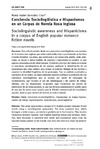Identificador persistente para citar o vincular este elemento:
https://accedacris.ulpgc.es/jspui/handle/10553/41657
| Título: | Conciencia sociolingüística e hispanismos en un corpus de novela rosa inglesa | Otros títulos: | Sociolinguistic awareness and Hispanicisms in a corpus of English popular romance fiction novels | Autores/as: | González Cruz, I. | Clasificación UNESCO: | 570510 Sociolingüística 550510 Filología |
Palabras clave: | Conciencia (socio)lingüística Hispanismos en lengua inglesa Cambio de código inglés/español Metadiscurso Sociolingüística, et al. |
Fecha de publicación: | 2017 | Publicación seriada: | Pragmática sociocultural | Resumen: | Este artículo estudia desde una perspectiva sociolingüística una muestra de 14 novelas rosa inglesas que están ambientadas total o parcialmente en las islas Canarias (España). Las obras, que pertenecen a un corpus más amplio, están salpicadas, en mayor o menor medida, de palabras y expresiones en español, ya que algunos personajes son de habla hispana. El objetivo principal del trabajo es mostrar la conciencia sociolingüística de las autoras, mediante la identificación de los mecanismos que estas utilizan para recrear el contexto bilingüe de las novelas y construir la identidad lingüística de los personajes. Tras un análisis cuantitativo y cualitativo de los textos, los datos obtenidos parecen confirmar la existencia de una conciencia sociolingüística que se expresa por medio de estrategias de representación, que incluyen el uso del metalenguaje y del cambio de código. Además, con los hispanismos recopilados aquí iniciaremos las labores de elaboración de un futuro glosario, lo que nos llevará a plantearnos el posible papel de este tipo de textos como canales para la difusión internacional del vocabulario español, dado su gran número de lectores en todo el mundo. This paper approaches a sample of 14 English popular romance fiction novels using a sociolinguistic perspective. The texts analyzed here, which belong to a wider corpus, are totally or partially set in the Canaries. They involve interaction between Spanish- and English-speaking heroes and heroines, therefore, their discourse is sprinkled with words and expressions taken from the Spanish variety spoken in the islands. Our main aim here is to show the authors’ sociolinguistic awareness, by identifying those mechanisms which contribute to the recreation of the bilingual context and to the linguistic representation of the characters. The data obtained after a quantitative and qualitative analysis of the texts seem to confirm that the autors’ sociolinguistic awareness is revealed mainly by their resorting to a number of strategies for representation, including metadiscourse and codeswitching. The hispanicisms which occur in these texts are also helpful to begin the compilation of a glossary, which makes us ponder upon the role this type of texts might play as possible channels for the international spread of Spanish vocabulary among their wide readership. |
URI: | https://accedacris.ulpgc.es/handle/10553/41657 | ISSN: | 2194-8305 | DOI: | 10.1515/soprag-2017-0014 | Fuente: | Pragmática Sociocultural [ISSN 2194-8305], v. 5 (2), p. 125-149 |
| Colección: | Artículos |
Visitas
242
actualizado el 15-ene-2026
Descargas
326
actualizado el 15-ene-2026
Google ScholarTM
Verifica
Altmetric
Comparte
Exporta metadatos
Los elementos en ULPGC accedaCRIS están protegidos por derechos de autor con todos los derechos reservados, a menos que se indique lo contrario.
